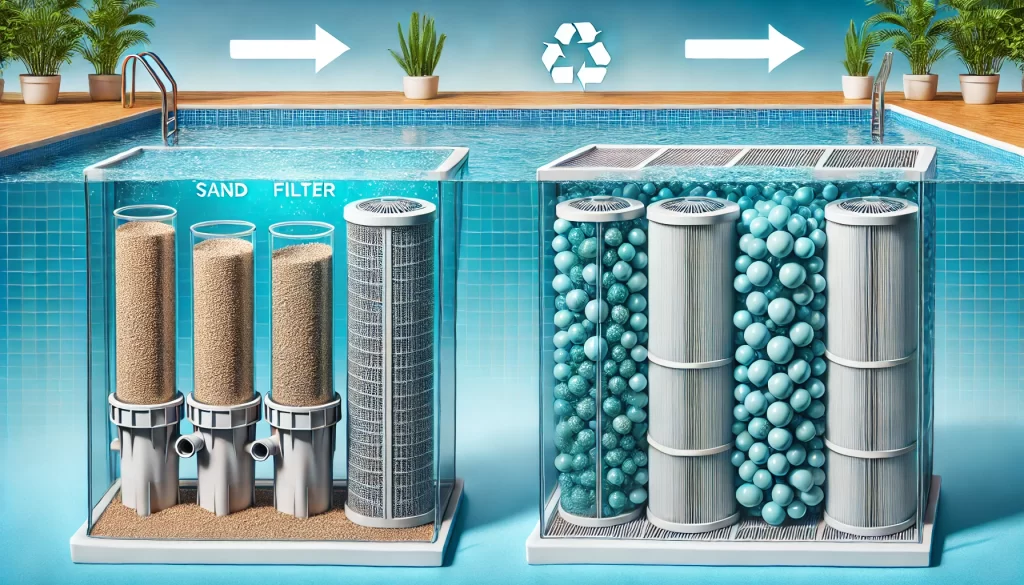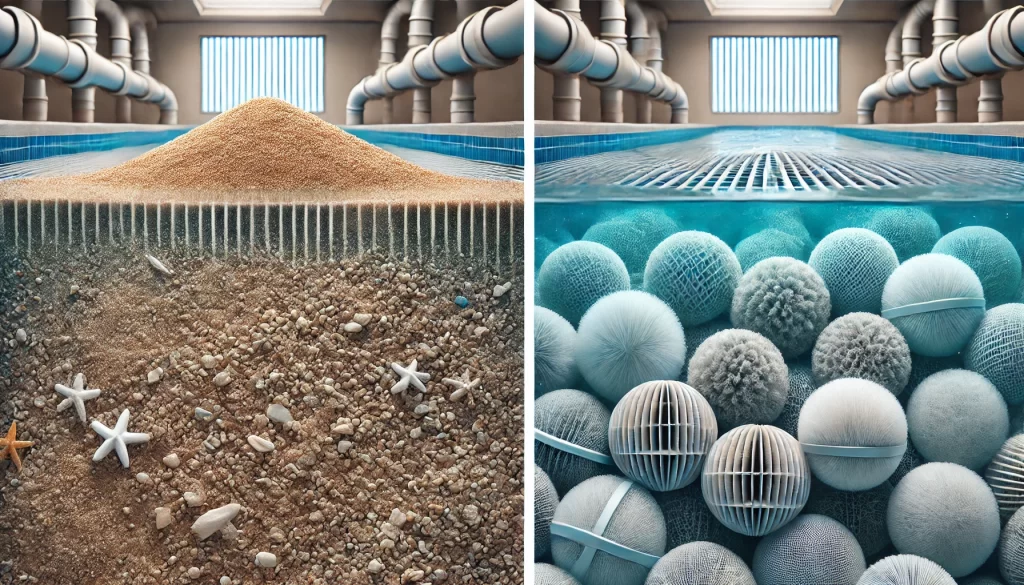When maintaining a pool, choosing the right filtration system is crucial. Traditionally, pool owners have used sand filters. However, a newer option, pool filter balls, has emerged. This article will compare these two options, highlighting their benefits and drawbacks. We’ll help you decide which one is better for your pool.

I. What Are Sand Filters?
Sand filters are the traditional choice. They use fine sand to trap dirt and debris. Water flows through the sand, which acts as a sieve. Over time, debris builds up, and the filter needs backwashing.
Backwashing removes the trapped particles, restoring the sand’s effectiveness. Sand filters are easy to maintain. They require backwashing once every week or two.
However, sand filters have some limitations. They are heavy and bulky. Sand also needs replacement every 3 to 5 years, which can be a hassle.
II. What Are Filter Balls?
Filter balls pool technology is a recent innovation. Instead of sand, these filters use small, lightweight balls. These pool filter balls are made of synthetic fibers. They trap dirt and debris just like sand, but with a few advantages.
First, filter balls pool are much lighter than sand. A 700-gram bag of pool filter balls can replace 25 kilograms of sand. This makes them easier to handle and install.
Second, filter balls don’t require backwashing. Simply rinse them off when they become dirty. This reduces water waste and saves time.
Lastly, filter balls pool can last up to five years with proper care. They also filter finer particles, resulting in cleaner pool water.
III. Installation and Setup
Both systems are relatively easy to install. Sand filters require pouring the sand into the tank, which can be a messy process. Conversely, installing pool filter balls is straightforward. Just add the filter balls into the tank. Since they are lightweight, handling them is simple.
Moreover, filter balls can be used with most standard pool filter systems. No special equipment is needed, making them a versatile option.
IV. Filtration Efficiency
Efficiency is a key factor in choosing a filtration system. Sand filters are effective for general cleaning. They can trap particles as small as 20 microns. However, smaller particles may pass through the sand, causing cloudy water.
In contrast, pool filter balls trap particles as small as 5 microns. This makes them more efficient at removing fine debris. As a result, your pool water will look clearer and cleaner.
Additionally, filter balls pool systems can run more smoothly. The lightweight material allows for better water flow. This can reduce strain on your pool pump, potentially extending its life.
V. Maintenance
When it comes to maintenance, both systems have their advantages. Sand filters require regular backwashing to clean the sand. This process wastes a significant amount of water. In contrast, pool filter balls only need to be rinsed. This saves both time and water.
Another point to consider is replacement. Sand filters need new sand every few years. This process is labor-intensive. On the other hand, pool filter balls can last up to five years. They don’t degrade as quickly as sand, making them more durable.
VI. Cost Considerations
Price is always a concern when choosing pool equipment. Sand filters tend to have a lower initial cost. A standard sand filter is affordable, and the sand itself is cheap. However, you’ll need to replace the sand every few years, which adds to the long-term cost.
Pool filter balls may have a higher upfront cost. However, they last longer, so you save money in the long run. Additionally, the reduced need for backwashing lowers your water bill. Over time, filter balls pool systems can be more economical.
VII. Environmental Impact
Environmental impact is an important consideration. Sand filters require frequent backwashing, which wastes a lot of water. This can be a concern in areas with water restrictions.
In contrast, pool filter balls reduce water waste. They don’t need backwashing, which saves thousands of liters of water annually. Additionally, pool filter balls are washable and reusable. This makes them a more sustainable choice for eco-conscious pool owners.
VIII. Which is Better for Your Pool?
Choosing between sand filters and pool filter balls depends on your needs. If you prefer a low-cost, low-maintenance option, sand filters might be best. They are reliable and simple to operate.
However, if you want cleaner water with less maintenance, filter balls pool technology offers a clear advantage. They are more efficient, lightweight, and eco-friendly. Additionally, the long-term savings on water and sand replacements make them an appealing option.

IX. Conclusion
Both sand filters and pool filter balls have their merits. Sand filters are tried and tested, offering affordable filtration. However, filter balls pool systems are an innovative, efficient, and environmentally friendly alternative. Their ease of use and superior filtration make them a great choice for modern pool owners.
In the end, the decision comes down to personal preference. Whether you choose sand or pool filter balls, maintaining your pool will be easier with the right filtration system in place.

 Instant
Quote
Instant
Quote Email
Us
Email
Us